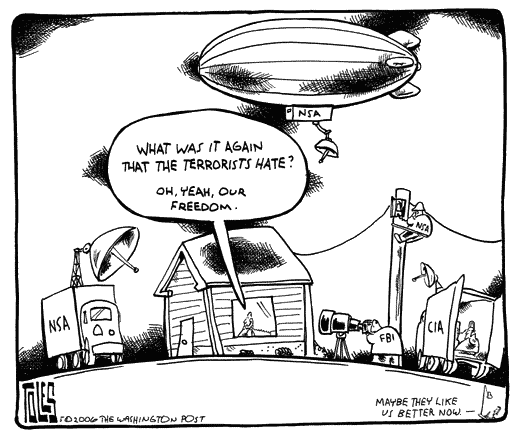Grilling The General: It's Time To Get Some Answers
UPDATE #2: The open session of today's hearings is almost over. We haven't gotten many answers.
Today begins the confirmation hearings for potential CIA chief Gen. Michael Hayden. These hearings have taken a greater importance given Hayden's previous role at the NSA at the time President Bush authorized his warrantless surveillance program. One would think that the numerous conflicts of interest (his connection to the growing NSA scandal, to the Defense Dept, White House, etc) would be enough for most Senators to vote 'no' here, but I think he will be confirmed with ease. Sadly, very few Senators will want to go on the record as having voted against a military man in a time of war(s). Still, the hearings provide a great opportunity for any courageous Senators (okay, just Russ Feingold, who sits on the Intelligence Committee) to grill the General about the surveillance program.
Back in March, I made a list of serious questions that should be asked in regards to the program and the President's actions. To date, none of these questions have been answered. Surprise! I am copying and pasting these answers here, as a way of crossing my fingers in hopes that I, a lowly blogger, do not have a more inquisitive mind than members of the United States Congress.
Questions that should be asked- Why did the President need to break the law, as opposed to simply wanting to? How did the incredibly accomodating provisions of FISA (which, among other things, provides options for retroactive warrants) hamper the President's ability to move quickly in ordering surveillance? Did the President and the Justice Department just think up the AUMF and/or Article II legal justification after the program was outed or is that what they believed all along? Why did the President make several statements in 2004 making it clear (falsely) that all wiretapping involved court orders? How does this program relate to recent reports of the Pentagon (etc) spying on peaceful political activists? How many secret, illegal spying programs are going on? Why did it take so long for Congress or the courts to be briefed on them? Since no court orders or records are kept of this warrantless wiretapping, how can they offer assurances that innocent Americans aren't being spied on (factoring in FBI reports noting that this has happened)?
More- Considering terrorists are very well familiar with methods and practices of surveillance, how did the leak hurt national security? Does the President respect whistleblower laws? What impact does jailing reporters have on a democracy? Does the President believe there is any limit to his power? If so, where specifically would he draw the line?
Finally, some new questions that have arisen since March...
How is it legal or right to collect a massive database of billions of Americans' phone records? How do these programs even help us in terms of terrorism? Are they even essential or necessary? Did the government force the telecommunication companies to hand over customer records and/or authorize them to lie about their involvement? Why did the Justice Department so willingly allow its investigation of the program to be killed? Why the NSA kill a program developed in the late '90s that would have "enabled it to gather and analyze massive amounts of communications data without running afoul of privacy laws"? Was it because of "a sudden White House expansion of the agency's surveillance powers"?
Finally, since we now know that journalists are being spied on, why should we believe any assurances that ordinary Americans aren't being spied on? How far does this program?
My expectations are not very high that much of this will addressed.
AP: Hayden to Face Tough Questions at Hearing
[UPDATE #1: As an illustration of the lack of a grownup debate over these issues- and the desire by partisan Republicans to dismiss opposition as being from weak Democrats who support terrorism- look no further than today's lead editorial in the NY Post. In what they no doubt considered an intelligent argument, they wrote "Only a moron would object to such [surveillance] precautions - and a malign moron, at that. Sadly, Washington doesn't lack for morons - so Hayden's role in developing these programs is going to be a major issue in his confirmation process." To the majority of Americans- Republican and Democrat alike- shown in polls to be concerned about these programs, you are apparently a moron. They conclude that readers should "pay close attention [during the hearings] to those who oppose the nomination, and to those who support it. To those who oppose a vigorous anti-terrorist stance, and to those who support keeping America safe. This nomination is a no-brainer." Signed, Karl Rove.]



0 Comments:
Post a Comment
<< Home